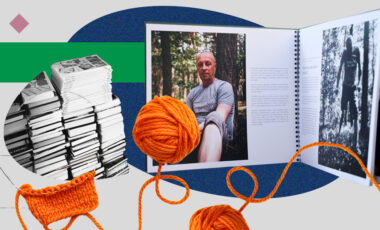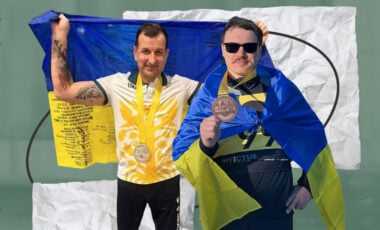If a child has Down syndrome or autism. How should parents accept? Advice from a psychologist and a mother who could
The key thing is not to forget that diagnoses such as Down syndrome or autism are merely a part of life. Yes, life changes, but it continues; we can make it wonderful for ourselves and our children. We explain what can help.

Photo Getty Images
Throughout its existence, humanity is constantly faced with extreme conditions: war, pain, famine, disease, and epidemics. It seems these companions of human existence are eternal. Now, fortunately, we're deprived of and don't know many sources of suffering, but still, one of the civilization problems hasn't been defeated yet, even in the most developed and progressive countries: a serious children's disease. Moreover, some challenges require new, previously unknown solutions, such as perinatal lesions of the nervous system, genetic abnormalities, autism spectrum disorders.
Parents may learn the fact that a child has a developmental disorder during pregnancy. Parents are often informed of disappointing diagnoses at the maternity hospital. Sometimes, problems appear when the baby is a year or much older. The composition of the family, place of residence, social status, financial status, time after birth or even planning a child before the diagnosis is almost irrelevant. In any case, the joy, hope, and regularity of life are replaced by unexpected helplessness and anxiety for the future.
Accepting a child's diagnosis for parents is never easy. Parents, like any people finding themselves in a new difficult situation, at first face a whole flurry of difficult emotions: denial, confusion, grief, fear, pain, despair, resentment, anxiety, anger, injustice.
Olena Lytvyn, a family psychologist, head of the Dialog Psychological Assistance Center, and Hanna Davydenko, a public activist, mother of a teenager with autism, and a defender of the rights of children with disabilities, told us how to deal with these feelings and learn to live in new circumstances.
How parents should get through negative emotions
Olena Lytvyn, who's been working with children with various diagnosed developmental disorders and their parents for over 10 years, says that in the case of a child's difficult diagnosis, all these negative emotions are a perfectly normal reaction to tough circumstances.
The beginning of the path of their acceptance and further successful overpowering begins with a French proverb once considered the most important motto of medieval knights. Warriors, who clearly realized that life was far from a pleasant game, and understood that it was impossible to calculate all events in advance, lived under their own rules, and relied on their hearts, strength, and inner reserves:
"Do what you have to and come what may"
"We all dream of a better life for ourselves and our children and are never ready for illness, pain, and suffering. The pain and despair can be so enormous that mothers often say: it'd be better if I hadn't given birth; it'd be better not to have it in my life. Such a seemingly terrible reaction is also normal, for me as a psychologist," says Olena Lytvyn, "it speaks of the great pain and degree of suffering. At first, pain, fear, and stress is a normal mental response to a new difficult situation.
Life literally punches you in the guts. And when it happens, you need to stop and rest. First, it's important to lessen all traumatic factors.
Pause. Take time and live through your emotions, your state, and comprehend a new life situation (we're not talking about an emergency disease but a chronic one) and build a new life route.
Let's do it together."
Right to pain
"It hurts now. It's important to cope, because an emotional wound, like any other, requires time and conditions to heal."
1. Minimize re-trauma, protect yourself from people who cause sadness. Learn to break out of destructive dialogue and stop toxic interactions. You're defending yourself now.
2. Also protect yourself from your own shame and guilt. All people without exception have a risk of various injuries. Illness, accidents, suffering, and joy and happiness are part of life. It's how the world works. And, of course, it's not parents' fault if their child was born special or sick. Don't blame yourself for your feelings or thoughts, or for getting into this situation. Don't blame each other. Guilt and shame are emotions that distance us from other people. They don't allow to get closer and lead to separation. These emotions are now the worst enemies of well-being, the child's successful rehabilitation, peace, and mutual understanding in the family. Burn this evil with fire and don't let it germinate.
Naturally, if you were prone to self-blame and self-indulgence even before your child's illness, then it can be very difficult for you to cope and overcome this evil in a more emotionally difficult situation. Then it'd be good to seek the help of professionals to overcome this trait and grow above yourself.
3. Clean the wound. It's better to endure and express negative experiences on the outside than to silence and hide them inside. It's useful and normal to get angry, quarrel, shout, hit a pillow, push a wall when you're angry or in pain. Crying, howling, whining, sobbing are good.
If emotions come out, it's an excellent sign. The sooner and more openly you allow yourself to live through this state, shout emotions out, burn out, the sooner it'll become easier for you, and relief will come. Sometimes emotions and tears don't come immediately; on the contrary, stress can be so strong that emotional numbness and frostbite can occur. They consider it an even more serious condition than the emotional response. Remember, crying isn't shameful. The body gets rid of stress through physical response. There may be chills, tremors, sobbing, the desire to beat something; these are signals and signs of a healthy adaptation mechanism. Give them a place and gradually your body and mind will regain control of the situation.
4. Follow the reality principle. The most painful are hopes that don't justify themselves, and then each of them, as if a separate loss, brings additional pain and suffering. Therefore, it's important to use the reality principle. Literally, describe what's happening: get a quality diagnosis, which is important for your child (physical condition or developmental diagnosis), to understand the actual picture and start from it. In no case, don't compare its results with anyone else's. At this moment, it's happening to your child, and it's your life and your reality.
Reality isn't perfect and we can only move forward from a firm foothold and only from the point we're now at."
Building a life route. Parents as top managers
What becomes shocking news for the family may be commonplace for the doctor who brought it to the nervous parents. A private conversation rarely works out, parents don't feel support, or, vice versa, may accept the doctor's "not to worry" call or reference to the statistics of such cases as encouraging forecasts. Psychologists advise to start the comprehensive examinations as soon as possible, not to be afraid to ask doctors, to have the courage to assess the child's health situation soberly and comprehend it as calmly as possible.
New circumstances require alternative solutions. And you'll definitely be able to find them if you give yourself time.
"Don't fall into the 'we're wasting time' trap," Olena Lytvyn warns, "when it seems you have to do at least something in order not to waste time, because you may lose the opportunity to stop, look back, and plan your life well in a new situation."
First, take a break from thinking and planning. Give yourself time, because it's one of the most important stages. For example, when building a house, the architect's work is the most valuable, because good planning and design is something one cannot build a pleasant house without, and a complex one, even more so.
What are the resources? What are the priorities? Which rehabilitation and correction program to choose? What are the strengths of me, our family, our child?
At first, helplessness will prevail. It may seem that you're left without support and lost control of your life. But in reality, right now you're becoming the most important top manager of a project for the child's treatment, development, upbringing, and rehabilitation.
Parents' task as top managers is to establish processes, see the complete picture, keep a long-term plan in mind, set goals and break them into tasks. For you to have enough energy and resources for this intellectual and energy-intensive work, it's very important to delegate the responsibilities you can as much as possible.
As a top manager, create a plan:
It'll be great to form the goals most attractive for your situation, for your family, for your values and priorities. But for instance, you can have the following goals:
Long-term:
- With all the initial data, realizing your full potential in the best way.
- Helping your loved ones realize their potential in the best way.
- Being an active participant in your own life and a community member.
- Building proper communication and relationships with the child, in the family and outside the family
Short-term:
- Making this day better than the previous one every day.
- The good emotional well-being of the child and family.
- Optimizing and simplifying all processes in the family.
Set goals for your child's development together with the specialists you'll work with, rely on their experience, knowledge, and assistance, but also always remember that you're the major customer.
In the family's life, it's necessary to establish and automate systems as much as possible: treatment; communication and interaction; software; food; hygiene, etc.
Self-management: my (our) strengths, which I will develop and strengthen; what prevents me (us) from coping with the situation; what my (our) resources are. Make a list: what helps me feel better, what prevents me from it, what I rely on."
Importance of communication
"You may have different goals, but there'll always be a key one. The first and most important one for everyone and in any diagnosis, that people, unfortunately, often forget, is communication. It's extremely important to establish a process of exchanging messages, information, emotions within the family, between family members and the child, with specialists. I want to remind you," Olena adds, "about the so-called communication circles (they're essential for both small and large ones): if a communication circle is open, it's important to close it. For example:
- Thank you -> You're welcome!
- Good afternoon -> Greetings!
- How are you? -> Thank you, good!
We perform these cycles every day and each of us knows how unpleasant or painful it is when you don't receive an answer, or you aren't heard, or they answer the wrong question, or with the wrong intonation. Then you rarely want to continue communication until the contact is broken. Communicating well with a child with severe nosology is one of the top priorities. It's like saying all the time: I'm here, I feel you, I'm with you. It's very important to observe the child, its smallest movements of body and soul, and respond to them. Initially, communication with the child takes place on a non-verbal level, the level of bodily signals, and then it's crucial to develop speech, or you need to choose another convenient way for the child to communicate.
When the diagnosis is already there, it's essential not to stop seeing the child behind the diagnosis. It's important to always watch the child, as you need to remember that every child feels pain and joy. With the most serious diagnoses, with deep brain damage, with complex disorders in children, the need for attachment, the ability to feel and experience emotions stays the same. Be attentive to the child and its signals. It'll help you both and give more than one happy moment of contact and mutual understanding."
What kind of support is needed
"To travel your path, you should prepare for it. You already follow the reality principle, know the diagnosis and a starting point, set goals and objectives. And then you will need supports, guides, structures, rituals, rhythm. It's great when there's a coordinated team: spouse, family, grandparents, housekeepers, and, of course, the professionals you work with. At first, it may be necessary to establish team processes. In fact, it's one of the first and most significant tasks.
It's good to start rituals in the family and schedule family meetings and gatherings, where you can discuss everything: the child's diagnosis, the needed treatment, plans, successes, goals for the child, and, of course, for the entire family. Plans of couples, plans of parents, plans of children in the family. These meetings aren't only for problems, they're also for joy; they're for ordinary family life, conversations, discussions, plans, and games. For example, every Friday at 19.00, we have a family tea. Nice family traditions are very important in absolutely every family. It's the foundation and framework of the family. Include them in your plans.
Develop a comfortable and measured rhythm of life. It gives peace and a sense of support. By the way, children often need rhythms and structures that are clear to them, and it calms them down."
We shouldn't forget about rest. It's like fuel; it gives strength, energy. Like lubricant, it promotes many tasks and processes. Mom's emotional state comes first. Children in general, and a child with a disability in particular, are very sensitive to the state of their parents. "A calm mother means a calm child" aren't empty words at all. The child's strengths and resources are supported and fed by the parent's source.
"So learn to listen to yourself and your state," says the psychologist, "if there's tension or irritation, ask yourself: What are they? What are they trying to tell me? How can I fix the situation? Who can help? Often the child's disease mobilizes; you're able to notice and understand the main and most important values of life: mutual support, health, everyday joys, and the ability to enjoy simple and little things."
Don't stop being a family
Living with a child with a diagnosis isn't a spear fight, but a long march of a patient warrior which depends on a reasonable distribution of resources and a calm movement rhythm. A family with a child having a disease or diagnosis doesn't cease to be a family but simply becomes a family with extended options for caring for a child with special needs. The basic laws and principles of the family remain unchanged: the union of mom and dad is the primary basis and support for children. Family is a place where every member of the family feels important, feels great, and is emotionally charged.
Fortunately or unfortunately, challenges can show the weaknesses of the family; what used to be a mere crack can become a split under the pressure of the challenge. The father who learned about the child's illness is also in a state of stress. It's first acute and then becomes chronic. There may be a potent feeling of guilt and anger, prolonged depression, or severe despair. Fatherly instinct, unlike maternal, isn't formed immediately; it takes time and close contact with the child. The mother loves the baby for what it is and accepts it as it is. According to psychologists, men have a different behavior; they love children for specific achievements and for the future they symbolize. And when a child doesn't meet the father's expectations, dreams of an aspiring future are shattered. If a man can't readjust, change the request to the child, he'll also need the professional help of a psychologist.
A child with a disability is, first, a human being. And like any other person, it has its own path. Disability is just a particularity. Many children with severe diagnoses become quite independent not because they've been cured of Down syndrome or another illness, but because parents have formed adequate expectations for the child's development, and created a favorable environment for upbringing and learning.
"To go on the road and travel happily on a vehicle called a family, all bearing axles must be strong," says the expert. "Don't spare energy to communicate in the family and try to understand and hear each other. It's more important than ever to pass the crisis with dignity holding hands, although, unfortunately, not everyone succeeds."
Importance of friends
Everyone needs friendly communities, especially a person in extraordinary situations. With other people's help and support, it's possible to overcome any life obstacles. Naturally, the closest social circle is the family. Undoubtedly, good relations are essential here. After all, in a crisis, when the load becomes greater, it's especially important to unite and withstand this burden together, and not to fall apart or run in different directions.
But you also can do it outside the family, and you need it! Look for communication, communities, support groups. Communities are an immense force! Unfortunately, they don't always exist, but, fortunately, you can create them yourself. As a result, some parents help not only their children but also others, and they also find their resources there.
"Don't forget about old friends and search for new people you can rely on," Olena Lytvyn advises. "Don't deny yourself help if you can't cope on your own. Also, be prepared in advance that you'll have hard days, setbacks, disruptions, stress, deterioration; that's also normal. They are also components of any living process moving and developing. These falls and obstacles will no longer be news to you. You'll stop, take a breath, find support, and move forward. I believe in your success!"
Mom who succeeded
One of the examples of systemic effective assistance to families raising children with autism was created by the Child.ua Association. The project coordinator is Hanna Davydenko, the mother of a teenager with autism. Anna learned about her son's diagnosis when he was 2.5 years old.
"Parents, having received confirmation of their child's difficult diagnosis, are left alone with it. And mothers first start googling about the problem. And not all content is high-quality on the Internet. Therefore, they often go the wrong way, using unreliable methods. It was the same with me," says Hanna Davydenko. "After my son was diagnosed, I was depressed. I read a lot of different articles about the disorder (I occupied myself with this). But I did little for my son. I couldn't organize myself and my kid. In the web articles, I read about many approaches, special diets, exercises, tried to implement them, but it didn't help my son.
This serious condition lasted for several years. Since I'd like other mothers to accept the diagnosis and normalize life faster, I want to share effective advice.
- Seek help
Search everywhere and in various forms. Talk to your family about your condition and your needs. I sought help from my husband, mother, mother-in-law. But none of them helped me. Everyone found their reasons. I was offered help by more distant people: my brother, my husband's sister. But I refused their help, I thought it wasn't their concern. I was wrong; I had to use their support.
- Look for specialists
Qualified professionals must guide the child. It's the key to successful rehabilitation. Such specialists are often expensive. Look for finances for them. I didn't want to pay for specialists but preferred to work with a child myself. I lost a lot of time on it.
- Find a psychologist for yourself
It's essential. If you don't have the opportunity to pay for psychologist's services, then use a free one. For example, in the center of social services, there's a psychologist who'll help for free. Or there's an all-Ukrainian "Tell Me" project, where psychologists and psychotherapists consult. I took advantage of it this year and I'm happy. A high-level psychotherapist consulted me, and we began to be friends with her after consultations. Special psychological support groups are also sometimes organized for parents of children with disabilities. Take advantage of this!
- Use "E-Nanny"
It's state aid for mothers: a babysitter can be issued for babies up to 3 years old, for children with disabilities up to 6 years old. You're allocated about UAH 1200 for a nanny. The most difficult thing, in this case, is to find an acquaintance, sole proprietor, who'll include the activities of a nanny to documents and who'll be transferred the funds. But it's real. Don't miss it!
- Plan your days
That's what helped me get out of depression. I planned not only my day but also my kid's day. I took a piece of paper, wrote hours, and two columns next to them: me and my child. For example, from 14:00 to 16:00 the child sleeps, and in my column, I have cooking dinner and preparing for the developmental lesson that I'll give the child after sleep.
- You can find even more useful psychological self-help advice in the manual "The First 100 days for Parents of Children Diagnosed with Autism" from the Child.ua. Association.
It's a practical guide: the first section is about autism, and others explain to a mother how to help herself, organize the time and space of the child, and so on. The manual can be downloaded electronically by following the link."
There's strength in a union!
Associations of parents of children with disabilities and children with special needs are in almost every regional center. There you can communicate and help one another. Such communities exist not only as large public organizations but also as local mutual assistance groups.
Child.ua has been dealing with autism topic since 2015. Hanna Davydenko is the head of the Autism Friendly Space program, which aims to build a society friendly to people with autism. If you respond to this topic, Autism Friendly Space invites you to volunteer. The community already has 65 volunteers in different parts of Ukraine.
***
References used and recommended for reading:
- "Is There Life After Diagnosis?" Aliona Akulova;
- "Ghost Boy" by Martin Pistorius, Megan Lloyd Davis;
- "Every Child is Special. The Illusion of a Defect." Pietr Kolomoitsev, Christel Manske;
- "Kids Beyond Limits." Anat Baniel;
- "The 7 Habits of Highly Effective Families." Stephen R. Covey;
- "Engaging Autism." Stanley I. Greenspan, Serena Wieder.
Also, read our article Visiting sunny people: how inclusive cafes and restaurants work in Ukraine.

Special kids: What are the newest rehabilitation methods in Ukraine?

Unique Bohdan Kravchuk: how a guy with Down syndrome received a higher education
Photo Getty Images
























































